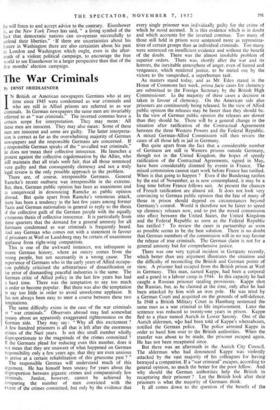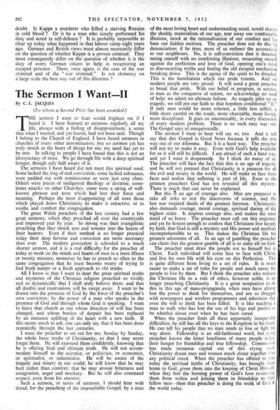The War Criminals
ByERNST FRIEDLAENDER
IN British or American newspapers Gentians who at any time since 1945 were condemned as war criminals and who are still in Allied prisons are referred to as war criminals. In German newspapers the same men are invariably referred to as " war criminals." The inverted commas leave a certain scope for interpretation. They may mean : All these men are innocent. They may also mean: Some of these men are innocent and some are guilty. The latter interpreta- tion is correct as far as the overwhelming majority of German newspapers and the responsible Germans are concerned. If a responsible German speaks of the " so-called war criminals," he does not'mean their collective innocence. He launches a protest against the collective clpdemnation by the Allies, who still maintain that all trials were fair, that all those sentenced were guilty and that consequently clemency and not a truly legal review is the only possible approach to the problem. IN British or American newspapers Gentians who at any time since 1945 were condemned as war criminals and who are still in Allied prisons are referred to as war criminals. In German newspapers the same men are invariably referred to as " war criminals." The inverted commas leave a certain scope for interpretation. They may mean : All these men are innocent. They may also mean: Some of these men are innocent and some are guilty. The latter interpreta- tion is correct as far as the overwhelming majority of German newspapers and the responsible Germans are concerned. If a responsible German speaks of the " so-called war criminals," he does not'mean their collective innocence. He launches a protest against the collective clpdemnation by the Allies, who still maintain that all trials were fair, that all those sentenced were guilty and that consequently clemency and not a truly legal review is the only possible approach to the problem. There _ are, of course, irresponsible Germans. General Ramcke's recent outburst was irresponsible in the extreme. But, then, German public opinion has been as unanimous and as unequivocal in denouncing Ramcke . as public opinion abroad. But quite apart from Ramcke's venomous attack, there has been a tendency in the last few years among former Nazis and German nationalists in general to reply to the thesis of the collective guilt of the German people with the equally erroneous thesis of collective innocence. It is particularly from these quarters that the demand for a general amnesty for all Germans condemned as war. criminals is frequently heard. And any German who comes out with a statement in favour of prisoners at Werl or Landsberg may be certain of unanimous applause from right-wing compatriots. This is one of the awkward instances, not infrequent in recent German history, where an outcry comes from the wrong people, but not necessarily in a wrong cause. The experience of Germans who in the early years of Allied occupa- ton publicly criticised the arbitrariness of denazification or tie error of dismantling peaceful industries is the same. The German critic of Allied policy in the last few years has had a hard time. There was the temptation to say too much is order to become popular. But there was also the temptation to say too little in order to avoid unwelcome applause. It his not always been easy to steer a course between these two temptations. The same difficulty exists in the case of the war criminals or " war criminals." Observers abroad may feel somewhat uneasy about an apparently exaggerated righteousness on the German side. They may say : " Why all this excitement ? A few hundred prisoners is all that is left after the enormous crimes of the Nazi years. Is not this small number wholly disproportionate to the magnitude of the crimes committed ? If the Germans plead for reducing even this number, does it not mean that they are unaware of what happened on German responsibility only a few years ago, that they are even anxious to arrive at a certain rehabilitation of this gruesome past ? "
The responsible German will understand much of this argument. He has himself been uneasy for years about the disproportion between gigantic crimes and comparatively few criminals. Justice, however, cannot be achieved by comparing the number of men convicted with the extent of the crimes committed, but only by the evidence that every single prisoner was individually guilty for the crime of which he stood accused. It is this evidence which is in doubt and which accounts for the inverted commas. Too many of those still held in prison were sentenced more as representa- tives of certain groups than as individual criminals. Too many were sentenced on insufficient evidence and without the benefit of the doubt. There was the almost insoluble problem of superior orders. There was, shortly after the war and its horrors, the inevitable atmosphere of anger, even of hatred and vengeance, which rendered justice, to be meted out by the victors to the vanquished, a superhuman task. As matters stand today, and as Mr. Eden stated in the House of Commons last week, prima fade cases for clemency are submitted to the Foreign Secretary by the British High Commissioner. Li the majority of these cases a decision is taken in favour of clemency. On the American side also prisoners are continuously being released. In the view of Allied public opinion the releases may be faster than they should be. In the view of German public opinion the releases are slower than they should be. There will be a general change in the situation after ratification of the Contractual Agreements between the three Western Powers and the Federal Republic. A mixed German-Allied Commission will then review the cases of all those left in jail in Germany.
But quite apart from the fact that a considerable number of Germans are still in Western prisons outside Germany, though not in the United Kingdom, the hopes of speedy ratification of the Contractual Agreements, signed in May, have been considerably dimmed by events' in France. The mixed commission cannot start work before France has ratified. When is that going to happen ? Even if the Bundestag ratifies by the end of November, as is now contemplated, it may be a long time before France follows suit. At present the chances of French ratification are almost nil. It does not look very convincing to German public opinion that the fate of many of those in prison should depend on circumstances beyond Germany's control. Would it therefore not be fairer to speed up clemency releases now, and to put the mixed commission into effect between the United States, the United Kingdom and the • Federal Republic as soon as the Federal Republic has ratified ? To review the cases in partnership as soon as possible seems to be the best solution. There is no doubt that German members of the commission will in no way favour the release of true criminals. The German claim is not for a general amnesty but for comprehensive justice.
There was one very typical incident in Germany recently, which better than any argument illustrates the situation and the difficulty of reconciling the British and German points of view. A prisoner had escaped from the British prison at Werl in Germany. This man, named Kappe, had been a corporal and a guard in a labour camp in 1944. In this capacity he had caught a Russian prisoner stealing provisions. Kappe shot the Russian, but, as he claimed at the time, only after he had been attacked by him with an iron pole. He was tried by a German Court and acquitted on the grounds of self-defence. In 1948 a British Military Court in Hamburg sentenced the same man as a war criminal to life imprisonment. Later the sentence was reduced to twenty-one years in prison. Kappe fled to a place named Aurich in Lower Saxony. One of the Aurich aldermen, wIto had been told of Kappe's whereabouts, notified the German police. The police arrested Kappe in order to hand him over to the British authorities. When the transfer was about to be made, the prisoner escaped again. He has not been recaptured since.
But there was an aftermath in the Aurich City Council. The alderman who had denounced Kappe was violently attacked by the vast majority of his colleagues for having betrayed a compatriot. If a "war criminal" escapes, according to general opinion, so much the better for the poor fellow. And why should the German authorities help the British in recapturing their prisoner ? Let the British look after their prisoners is what the majority of Germans think. It all comes down to the question of 'the benefit of the doubt. Is Kappe a murderer who killed a starving Russian in cold blood ? Or is he a man who simply performed his duty and acted in self-defence ? It is probably impossible to clear up today what happened in that labour camp eight years ago. German and British views 'Must almost necessarily differ on the question of whether Kappe is a proven criminal. They must consequently differ on the question of whether it is the duty of every German citizen to help- in recapturing an escaped prisoner. There, once again, is the case of the war criminal and of the " war criminal." Is not clemency on a large scale the best way out of this dilemma ?



































 Previous page
Previous page